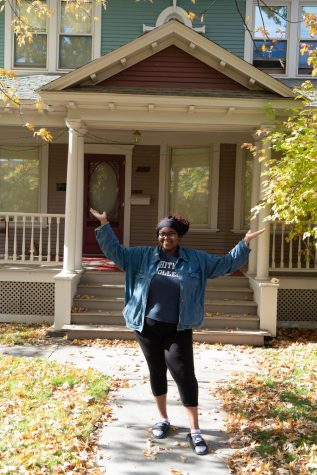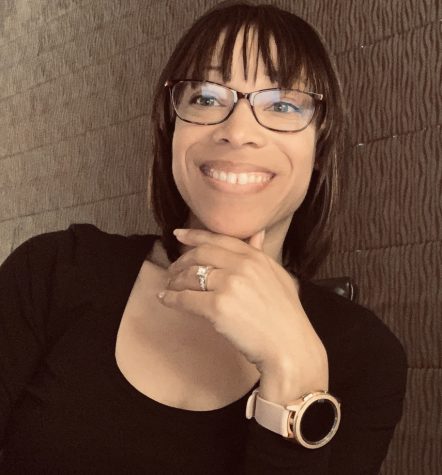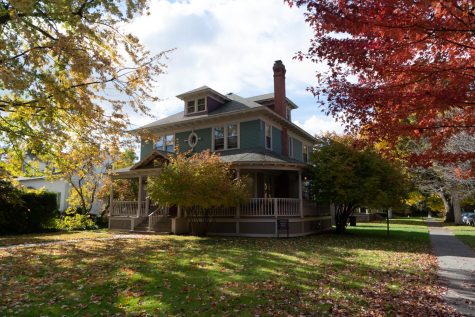Q&A with Shamiya Griffin and Dr. Rae Chresfield: The importance of the new Wellness House on campus
October 28, 2021
In a recent issue, The Wire featured the newest member of the Interest House Community: the Wellness House. However, this article failed to fully explain the origins of the Wellness House and entirely neglected to mention the work of Shamiya Griffin, the house’s RA, and Dr. Rae Chresfield, who started the house. This week The Wire sat down with Griffin and Dr. Chresfield to gain their perspective on the new Wellness House.
These two interviews were originally conducted separately.
Jaime Fields: Would you please introduce yourself?

Shamiya Griffin: My name is Shamiya Griffin; I am the RA of the Mental Health and Wellness House. I am a junior, and I am a psych major. I’m also a wellness peer for Dr. Rae in the Counseling Center.
Dr. Rae Chresfield: My name is Dr. Rae Chresfield, and I have been the associate dean of health and wellness and director of the Counseling Center since July 2019. I am originally from New York City and married my junior high school sweetheart who moved here from NYC to be the care coordinator, Rich Dunlop.
JF: [Shamiya,] could you tell me a little more about how you ended up with this RA position?
SG: Back in our spring semester…when I came back for my sophomore year second semester, I realized I was having a lot of trouble with my mental health. I reached out to Dr. Rae to talk more about my mental health, and I realized that a lot of other people of color [and] people that I knew were having trouble with mental health as well during that time. And I really believe that most of my issues came from being home so long with my family, and coming back to this school, it just instantly was all unfamiliar again.
I was telling [Dr. Rae] how I personally would like to do more about the mental health crisis that we were going through on campus, and she told me that she wanted to do something as well, and that she was actually planning on funding a house on campus because she wanted to be surrounded by wellness, and I was instantly and immediately interested in it. I knew that if I wasn’t going to be an RA, I was going to…apply to live there, but after talking to me, she knew that I would be the perfect person for the position, starting out as the first RA of this house, so she encouraged me to apply to be an RA, and we just went from there.
JF: [Dr. Rae,] how did the Wellness House come to be?

DRC: With the help of Rachna Sinnott, a grant for $60,000 from WSU and the state of Washington was awarded to Whitman College with me as the primary investigator. I had to use the funds to establish a Collegiate Recovery Program and could be creative about how I did that. After connecting with Triology to provide on-campus Recovery Meetings for Whitman students, I imagined how useful it could be to have a Wellness House. I wanted to create a place where students could live and have wellness central to their interests. Built into the house was the idea that the space would be sober and recovery-friendly for its residents.
I took my idea to ResLife and eventually received approval to use one of the houses to become the Wellness House. I chose the RA, Shamiya Griffin, and paid for her role as an RA from the grant funds. I had help from Leah Garcia-Hamby, the administrative assistant in the Counseling Center with receipts, scheduling, attending Recovery information meetings with the state and keeping me and the grant on track because it is in addition to both of our other responsibilities. As a result of Rachna, Shamiya and Leah, we were given another $20,000 this fall. Whitman College has the first Wellness House of its kind in the entire state of Washington.
JF: [Shamiya,] Could you tell me a little bit about Dr. Rae and her position, and what it means to be a wellness peer working with her?
SG: Dr. Rae is the head of the Counseling Center right now, and she has a fund from the JED foundation to… fund [its education] around campus. The JED foundation is a foundation that was founded by a grieving mother, who lost her son who unfortunately took his own life, and she wanted to spread awareness on mental health…she funds people to have the education on campus, so…people from the foundation are coming and educating people in the Counseling Center, and educating us as wellness peers—because that’s our job as wellness peers, to get that education from the foundation and apply it to our peers here on campus.
[Part of Dr. Rae’s] job is basically to help the Wellness House where we need it—she gives us advice and tips on wellness activities that we do inside the house. The house is also for individuals who are in recovery, if need be, if they need space to be in recovery, she would give information on how to help those people effectively and just make the environment healthy for everyone. That’s Dr. Rae’s part—[she’s] the most important person to the house, because without her we wouldn’t have anything.
JF: [Dr. Rae,] Can you please tell me more about your position and the wellness fellow position?
DRC: As the associate dean of health and wellness, I have a job description, however I have expanded on what I was originally tasked with. I am a member of CARE Team and share interventions with the group about how to help students. I cannot disclose any information that I have as director of the Counseling Center, but most folks on CARE Team are not clients. I also have a small connection with the Student Health Center and work to make services more accessible and equitable for students. I have chosen to provide workshops and training sessions with faculty, staff, students and families because it helps students overall if I share information on mental health with these different groups.
I partner with different offices to provide programming for students as well. I worked with Laura Sanchez to do “The Masks We Wear” to discuss and provide interventions for imposter syndrome. I have worked with Nikki Brueggeman to help seniors create strategies for going into the world during COVID-19. The Counseling Center staff (Deanna, Patrick, Brandon, Nick and Lily) have been providing outreach and training as well because we are trying to create more folks that can help students. I have also worked with Dr. Helen Kim and Dr. Mary Raschko to help faculty get a better understanding of mental health and how to help faculty and students. I have a lot of colleagues on this campus, that I have not named, that have partnered with me to make the mental health conversation a little easier to have and understand.
President Kathy Murray gave me funds to start a peer-to-peer wellness education program. The aim of the program is to train students on the eight Dimensions of Wellness and then share that information with students. Students can meet with other students and teach about concerns like sleep hygiene, physical fitness and present activities that focus on the eight Dimensions of Wellness. I am still seeking to hire two more wellness peers.
JF: What does this house mean for you, and what do you think it means for Whitman?
SG: I think for Whitman, this house is very important because it’s much bigger than just the house. The education from the JED foundation, just overall wellness and mental health, sobriety and recovery, is just really important for the campus to have. We do teach here that it’s okay if we want to drink, but Dr. Rae…is teaching harm reduction, and how if we are to engage, how to do it so we won’t have issues with it in the future.
What this means to me—honestly, it’s one of my favorite spaces that I’ve lived on campus. Just being an RA, and knowing that my residents are there for me as I am for them is great to have. I haven’t really had too many more issues surrounding mental health after I’ve came here because I’ve learned ways to cope with things, and even though I do still miss home, we kind of make it our own home here, just me and my residents…it’s very healthy for me both mentally and physically.
DRC: I am very proud to see my idea of the Wellness House move out of my imagination and into the community for students. I would not have been able to do so without the help of the women of color that helped me move it forward. I know how important recovery is, and some students just choose not to drink. From my perspective, the Wellness House means that Whitman gives students sober living options. It also seems to mean that Wellness is being integrated slowly into the culture. I hope that more information will be shared with the community, because it is still not widely known that the house exists.

JF: Is there anything else you’d like to tell me or think I should know?
DRC: It is my hope that my work and the work of other women of color in the community will be highlighted more and shared more often.
SG: It’s really a great experience to be able to be a part of something like this. I think a lot of the credit would go to Dr. Rae and her rigor in how she just puts together everything—I always try to tell her ‘just divide the work, I can help, you have people here who also want to do this,’ and she didn’t really realize that there are so many more people who are also interested in mental health until this house came along…We’re really working on doing a lot better for the campus, and doing a lot for mental health and overall wellness for the campus.





